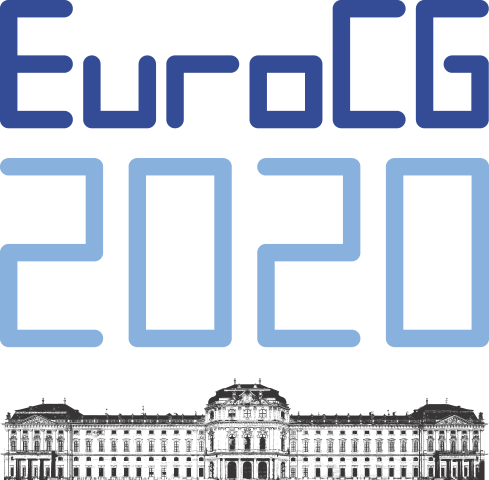Call for Contributions
EuroCG 2020 will be held March 16–18, 2020 at the University of Würzburg in Germany. EuroCG is an annual workshop that combines a strong scientific tradition with a friendly and informal atmosphere. The workshop is a forum where established researchers and students can meet, discuss their work, present their results, and establish scientific collaborations.
Important Dates
| EuroCG 2020: | March 16–18, 2020 |
| PhD School: | March 19–20, 2020 |
All deadlines are 23:59 AoE.
Invited Speakers
We have three invited speakers:
- Monique Teillaud, INRIA Nancy – Grand Est, LORIA
Otfried Cheong, SCALGO and KAIST[cancelled due to sickness]- Maarten Löffler, Universiteit Utrecht
- Erin Wolf Chambers, Saint Louis University
Topics of Interest
Topics of interest cover all aspects of computational geometry, including but not limited to the following:
- discrete and combinatorial geometry and topology,
- design and analysis of geometric algorithms and data structures,
- implementation and experimental evaluation of geometric algorithms,
- numerical and algebraic issues arising from implementations,
- analysis of geometric configurations,
- geometric modeling, visualization and simulation,
- combinatorial optimization,
- graph drawing,
- structural molecular biology,
- geometric puzzle analysis,
- geographic information systems,
- robotics and virtual worlds, and
- computer-aided design and manufacturing.
PhD School "Geometry and Graphs"
The workshop will be followed by a two-day PhD school on "Geometry and Graphs" (March 19–20, 2020). The program of the PhD school consists of a mixture of tutorials and exercise sessions.
Best Student Presentation Award
To recognize the effort of young researchers to present their work in a clear and elegant way, there will be a Best Student Presentation Award voted on by the EuroCG 2020 attendees.
Travel Support
Thanks to the main sponsor, the German Science Foundation (DFG), the organizers will be able to offer limited travel support for a small number of participants.
Submission
We invite authors to submit extended abstracts of original research. Submissions must be formatted in LaTeX using a supplied class file, and not be longer than 175 lines of text. Submissions will be handled through EasyChair.
Authors must use the LaTeX class files eurocg20 and eurocg20-submission, which are based on the LIPICS class file. These class files should automatically count all lines containing text, excluding title and references, and excluding figures. Authors are expected to make reasonable effort to make sure all lines that contain text are counted: the class file should be considered an aid, and the responsibility of correctly counting lines remains with the authors. For more information about the change to line counting, please refer to this page. A zip file containing an example of how to use the class file can be found here.
The main (175 line) body of your submission should be self-contained, and provide a clear and succinct description of your results. Your submission may include a clearly marked appendix with more details. An appendix is not required and will only be read at the discretion of the program committee.
Acceptance
EuroCG is a non-competitive forum. We will accept all submissions which are original, correct, well-presented, non-trivial, and in scope. For a detailed acceptance policy as used by the program committee, please refer to this page.
Proceedings
EuroCG does not have formally reviewed proceedings. A booklet of abstracts, without ISBN, will be accessible online from the webpage for the benefit of the community and must be regarded as a collection of preprints rather than a formally reviewed selection of papers. Results presented at EuroCG are expected to appear in other conferences with formal proceedings and/or in journals. In particular, papers that have been submitted to other formally reviewed conferences are eligible for being presented at EuroCG, assuming they have not been presented at a conference or published in a journal by the time of the conference. Authors of selected papers will be invited to submit extended versions to a special issue of the journal Computational Geometry: Theory and Applications.
Authors of accepted submissions are expected to present their work at the conference. Failure to do so may result in removal of the contribution from the abstract booklet and conference website.
Authors from countries where obtaining a visa for Germany is difficult and/or time-consuming are asked to contact the PC chairs when submitting their paper. We strongly encourage these authors to arrange for dates at the German embassy before the submission deadline. If necessary, the PC chairs will try to speed up the review process for the respective papers.

